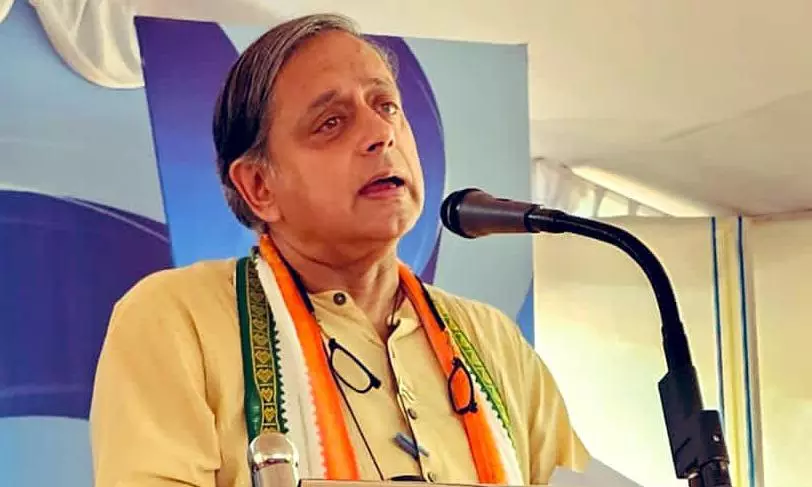Kerala Congress Power Struggle: Nair Leaders in Focus
Shashi Tharoor's controversy intensifies Kerala Congress' leadership tussle, with Nair leaders vying for dominance ahead of 2026 elections

Thiruvananthapuram: Shashi Tharoor's recent controversy has put the spotlight on five prominent Congress leaders from Kerala's Nair community, all vying to lead the party in the 2026 assembly elections.
The contenders include Opposition Leader V D Satheeshan, Former KPCC President Ramesh Chennithala, AICC General Secretary K C Venugopal, Former PCC President K Muraleedharan, and now Shashi Tharoor.
Satheeshan and Chennithala are considered strong contenders, while Venugopal's close ties with Rahul Gandhi make him a dark horse in the race. Tharoor's entry, though marred by controversy, has caused a stir among the other Nair leaders.
Supporters of V D Satheeshan, the opposition leader in the Kerala Assembly, think he's the obvious choice to be the Chief Ministerial candidate. They believe he has what it takes to lead the party to victory. On the other hand, close associates of Ramesh Chennithala, a veteran politician who has held key positions like PCC president and opposition leader, argue that his vast experience makes him the ideal leader to secure a win for the party.
Congress General Secretary K.C. Venugopal, a Member of Parliament from Alappuzha, is a strong contender due to his proximity to Rahul Gandhi. Additionally, there are those who believe K. Muraleedharan, son of Karunakaran and a former PCC chief and ex-MP, deserves recognition for his loyalty.
All these leaders hail from the Nair community, which makes up around 14% of the population and holds significant influence in politics, economics, and society. However, their support extends beyond communal and religious lines, demonstrating their broad appeal.
The rise of new leaders in Kerala's Congress seems to coincide with the end of an era marked by the likes of K. Karunakaran, A K Antony, and Oommen Chandy. These emerging leaders have stepped out of the shadows of their predecessors, but there's a noticeable void - none have yet achieved the same level of mass appeal as their illustrious predecessors.
This leadership vacuum may have created an opportunity for leaders like Shashi Tharoor to position themselves for a more significant role in Kerala's politics.
In Kerala, voters don't solely cast their votes on caste lines, but the social profile of candidates does play a significant role in maintaining community balance. The Nair Service Society (NSS), the prominent organization within the Nair community, publicly endorses and comments on leaders, influencing the political landscape.
From "Delhi Nair to Tharavadi Nair"
Recently, Ramesh Chennithala was invited to speak at the NSS annual event, notable given his past rift with the organisation. The rift stemmed from Chennithala's statement that he shouldn't be solely identified as a Nair, as he represents all communities, which didn't go down well with the NSS leadership
The NSS has surprisingly warmed up to Shashi Tharoor, after keeping him at arm's length for a long time. Previously, the NSS had dubbed him a "Delhi Nair," implying he was out of touch with his Kerala roots. However, they've now done a U-turn, embracing him as a "Tharavadi Nair," a term that signifies an aristocratic lineage within the Nair community.
Despite the NSS's claims of maintaining an equidistant policy, its affinity for the Congress party is no secret. This was evident during the 2021 assembly elections when NSS General Secretary Sukumaran Nair openly advocated for a change in government after casting his vote. However, the election results told a different story, with the Left Front coming back to power, a first for Kerala since the 1970s.
Political analysts argue that Sukumaran Nair's anger towards CPM is unjustified, given the Pinarayi Vijayan government's efforts to accommodate his community, including on the Economically Weaker Sections (EWS) issue. A significant 9 out of 21 ministers in the Pinarayi Vijayan Cabinet belong to the Nair community.
OBC, Dalit Representation
Only a few prominent leaders from the dominant OBC Ezhava community, which makes up 24% of the state's population, have emerged as strong contenders. KPCC president K Sudhakaran is a notable exception.
Dalit Representation: Despite Rahul Gandhi's vocal support for Dalit rights, representation and caste census, Congress leaders have been conveniently silent on implementing his agenda in God's Own Country.
The ruling Left Front too has neglected the Dalit community, denying them the representation they deserve. When K Radhakrishnan became MP, the Pinarayi Vijayan government failed to appoint a minister from the Scheduled Castes community, leaving a glaring void. This oversight is striking, considering the community's significant population of around 11% and their longstanding loyalty to Left parties.
Meanwhile, the Congress party is facing its own set of challenges. The party's immediate focus is on addressing the role of its Nair leaders, with broader community equations and dynamics taking a backseat for now. Shashi Tharoor's recent actions have prompted the party to take decisive action, and swiftly at that.

